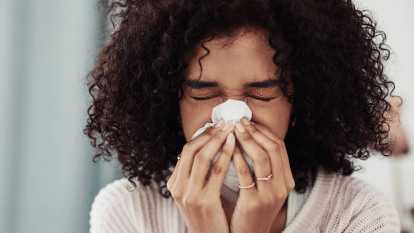Why Menopause Causes Anxiety and Depression (And What You Can Do About It)
It's not all in your head — there's a root cause.

When feelings of anxiety or depression arise, it’s easy to blame external triggers. You might be stressed about your job, holiday cleaning and gift giving, the health of you and your loved ones, or all of the above. Daily stressors do cause a dip in mental health — but if everything just feels off, it could be something else: Symptoms of menopause.
Whether you’re in perimenopause (the time leading up to menopause, when the menstrual cycle becomes irregular) or menopause, anxiety and depression can take root. What’s worse, these topics are still taboo in certain circles. And when three off-limits subjects collide, it makes it all the more difficult to find ways to speak about them with the right people. Here’s what you need to remember: It’s not just because of external stress, it’s not all in your head, and it’s okay to talk about it. To better explain the link between menopause, anxiety, and depression — and what you can do to ease symptoms — we reached out to some medical professionals.
Meet our expert panel.
Bruce Dorr, MD, FPMRS, FACOG is board-certified in Obstetrics and Gynecology and subspecialty boarded in Female Pelvic Medicine and Reconstructive Surgery. He is also a senior medical advisor for Biote, a leading hormone optimization and education company.
Dr. Amy Killen, a medical advisor at Joi Health, is board certified in Emergency Medicine with 10+ years of direct patient care. She is fellowship trained in Anti-Aging and Regenerative Medicine through the American Academy of Anti-Aging Medicine. In addition, she has done extensive training in aesthetics, platelet-rich plasma and stem cells, hair restoration, bio-identical hormones, nutrition, fitness, and sexual health.
Dr. Florence Comite, founder and CEO of the Comite Center for Precision Medicine & Health and Groq Health, is a clinician-scientist and innovator in the field of precision medicine. She is world renowned for her expertise in predicting, preventing, and reversing chronic disease and the disorders associated with aging.
Why does menopause bring on anxiety and depression?
First, Dr. Dorr says menopause creates the perfect storm for poor mental health. “Consider that many women suffer from sleep interruption and deprivation due to night sweats and hot flashes,” he says. “This can lead to depression, anxiety, and fatigue in and of itself. However, combining this lack of sleep with [other menopausal symptoms] creates a perfect storm for anxiety and depression.”
Dr. Dorr also asserts that hormone fluctuations are the main issue. “The root cause of these symptoms is hormone loss,” he says. “Estrogen and progesterone are both hormones; they act as chemical messengers that bind and send signals to cells all over the body to activate their processes. They are mainly produced in the ovaries. During perimenopause, the production of estrogen and progesterone may fluctuate significantly. When production stops at menopause, hormone levels go to virtually zero.”
Dr. Killen says estrogen loss increases depression risk. “The loss of estrogen in particular increases a woman’s risk for depression, especially if she has a prior history of depression,” she adds. “In fact, women with a history of depression are five times more likely to develop depression again during perimenopause and menopause. During early menopause, many women also suffer from insomnia, which is known to make depression worse.”
Dr. Comite says progesterone loss causes a domino effect of poor sleep and bad moods. “Without ovulation, the hormone progesterone (which normally increases post-ovulation in the second half of the menstruation cycle) declines,” she explains. “Progesterone is likely the key variable supporting mood and sleep. Normally calm women therefore become anxious during the perimenopause … and as a result of the physical and emotional stresses that causes, anxiety is a very common side effect that can extend into clinical depression.”
A lack of testosterone is just as impactful as a lack of estrogen and progesterone. “In addition, women start losing testosterone in their 20s,” says Dr. Dorr. “By age 40, their testosterone levels are reduced by 50 percent. The drop off in production is what causes common menopause symptoms such as night sweats, hot flashes, sleep disturbances, fatigue, and symptoms of anxiety and depression.”
Why is it hard to pinpoint menopause as the cause of mental health issues?
“Cognitive and mental symptoms, such as anxiety and depression in particular, can have a significant impact on daily life,” says Dr. Dorr. “But they are not as well-known, more difficult to isolate than physical symptoms, and often symptoms of other conditions. In many cases, the patient herself is unfamiliar with menopause and assumes her symptoms are due to something else.”
“Other physical effects and life stressors can make matters worse and escalate feelings of hopelessness that contribute to depression,” Dr. Comite points out. “Menopause often comes at a time when a woman is dealing with a confluence of emotional stressors, like aging parents, getting kids off to kindergarten or college, and job stress. Feelings of low self-esteem and unhappiness with body image are often part and parcel of ‘the change.'”
How long can menopausal anxiety and depression last?
Unfortunately, symptoms can start in perimenopause and linger well into postmenopause. (A person is considered postmenopausal if they had their last period at least 12 months ago.) Dr. Killen also points out that perimenopause can start 10 years before menopause. So, some women may experience symptoms for decades.
Bouts of anxiety and depression can last anywhere from a few hours to months on end. Other factors, such as chronic health conditions, lifestyle, and smoking habits may exacerbate symptoms. Fortunately, different treatment options can help alleviate symptoms.
How can I treat anxiety and depression during menopause?
While there are many different treatment paths you can pursue, Dr. Dorr, Dr. Killen, and Dr. Comite recommend the following.
Hormone Replacement Therapy
Dr. Dorr believes in addressing the root cause: hormone loss. “When treating any disease or issue, you should treat the root cause. Don’t put a label and a bandage on only the symptoms,” he says. “The root cause of these symptoms is hormone loss. But because providers often have very little training in the treatment of menopause and accompanying symptoms, they often immediately prescribe sleeping aids and antidepressants to treat only the symptoms. This is well-intended, but these prescriptions often cause additional problems such as libido loss, sexual dysfunction, and weight gain.
“It is critical to treat the root cause of menopause symptoms, which is hormone imbalance. Many of my female patients have gradually weaned off of all prior prescription medicine once I have replaced and balanced their hormones. And they have been able to get their diet and exercise regimens back in order.”
The right replacement therapy will differ for every patient. Hormone Replacement Therapy (HRT) is not for everyone, because it comes with risks. “Hormone optimization (also referred to as hormone replacement therapy) is quite effective in dealing with the anxiety, depression, and other symptoms of menopause,” says Dr. Comite. “The goal is to maximize benefit and minimize risk for each woman … Consult with a qualified specialist, gynecologist, or clinician to explore which hormones are appropriate for you.”
“The range of hormone replacement therapy includes estrogen, progesterone, and testosterone, as well as thyroid and adrenal types,” adds Dr. Dorr.
You can receive HRT in a wide variety of ways. Treatment methods include pills, injections, patches, gels, sprays, and vaginal creams. Dr. Dorr recommends delivery via a pellet, which is the size of a grain of rice and gets placed under the skin. “It provides customized and consistent precision dosing directly into the bloodstream,” he says.
HRT may help more than just your classic menopause symptoms. “Many women use hormone replacement therapy to relieve classic menopausal symptoms, such as night sweats, hot flashes, and vaginal dryness,” he continues. “However, there is a great deal of evidence showing that HRT … also improves many different areas of our health over the long term … HRT can restore your hormones to an optimal level, which helps protect the brain, heart and bones … In fact, studies have shown that optimal testosterone levels in women may reduce the incidence of breast cancer. ”
Lifestyle Changes
Like Dr. Dorr, Dr. Killen recommends HRT, but also creating healthy habits. “Lifestyle changes, such as getting regular exercise, eating a healthy diet, and making time for mindfulness practices — such as meditation, breath work, and walks in nature — can all help reduce anxiety symptoms during menopause,” she says. “Depressive symptoms may also improve with regular exercise, balanced diet, daily sunlight exposure, time spent with friends and family, quality sleep, and refraining from drugs and alcohol. In cases of severe depression and anxiety, seeking help from a medical provider is appropriate.”
A Multi-Step Approach
Dr. Comite believes that there’s no one remedy that works for everything; you will need to address your symptoms with multiple courses of action. “Through my training as an endocrinologist and more than two decades of partnering clients … I’ve learned that the best results for successfully handling anxiety and depression derive from a multi-pronged approach,” she says. “Putting yourself first in a rational way is key. Focus on your health. Eat well, avoid processed food when possible, exercise, and explore restorative practices. Aim for quality sleep, at least six to eight hours. Practice mindful meditation, if that’s your thing. Other mindful practices like yoga and qigong can help you feel in more control of your body and thoughts.
“When the symptoms and stresses of menopause cross the line from mild anxiety to clinical depression, do not hesitate getting support from a qualified clinician. Follow up with your primary care physician, gynecologist, or a psychiatrist. They can suggest supplements and prescribe anti-depressant medication and other drugs that will ameliorate your symptoms. It may be hard to do so initially, when depressed, but do take the first step and believe you will feel better.”
Why is it important to talk about menopause, anxiety, and depression?
“Most women are not given a roadmap of what to expect during perimenopause and menopause,” explains Dr. Killen. “So, when they encounter severe mood changes, such as anxiety and depression, they have no idea what’s going on or how to fix it. It can be extremely scary and frustrating. Hormones like estrogen, progesterone, and testosterone play such big roles in how we feel. It’s important for women to know that many of the mood changes that happen before and during menopause are treatable with hormones and lifestyle changes. No woman should have to suffer with anxiety and depression brought about by hormonal changes.”
This content is not a substitute for professional medical advice or diagnosis. Always consult your physician before pursuing any treatment plan.
This article was updated on January 19, 2023.













